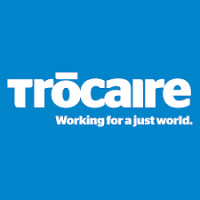
- Background
Trócaire is an Irish organisation that works in partnership with communities in over 16 countries to
- Defend human rights,
- Achieve climate and environmental justice,
- women’s girls’ protection, voice and influence,
- Save lives and protect human dignity and
- Mobilize the public to achieve global justice.
Since 1992, Trócaire Somalia has been providing comprehensive, safe and inclusive humanitarian and development programme in the Gedo region of the Southern Somalia by integrating health, nutrition, WASH, protection, resilience and basic education to address needs among the most marginalised and vulnerable people during emergencies and building resilience of communities to prepare for and mitigate future emergencies.
While our work in the Gedo is best understood as an ongoing humanitarian programme in a complex emergency, Trocaire Somalia is committed to addressing longer term recovery, by linking essential relief/lifesaving work to resilience and ‘building back better’ in most of its programming.
The training facilitator will conduct training on kitchen garden/Sack farming to 18 project staff comprising of 15 agricultural extension workers and 3 supervisors and 30 IGA women participants in 3 districts of Luuq, Dolow and Belethawa.
Target Group: Vulnerable Women in Gedo.
Sourcing-Local Hire (National).
Project Location-Gedo
Specific Districts: Luuq, Dollow, Belet Hawa.
Duration –April-May 2024 (20 DAYS MAX).
- Project Overview
Conflict has propelled women in Somalia to take on breadwinner positions. According to the World Bank[1], more than half of Somali households are headed by women, and approximately half of female headed households are living below the poverty line. Sixty-nine percent of the population covered by a 2016 World Bank survey live in poverty, ranking as one of the world’s poorest countries. Poverty is higher among rural and IDP households, and households without remittances.
Somali society includes a sizeable group of ‘minorities’ who have historically faced significant discrimination and abuse, enjoy the least protection from armed violence, and are often a difficult group to access with basic services and humanitarian aid, as aid targeting them can easily be diverted by stronger groups. Households from clans considered ‘guests,’ which include internally displaced persons (IDPs) in a dominant clan’s area, also enjoy fewer rights.[2]
In light of these prevailing circumstances and the fact that low social economic status is a leading cause in child malnutrition, Trocaire is implementing a five-year Nutrition project funded by Irish Aid to address immediate lifesaving nutrition needs. The core component of the project is to provide life-saving nutrition services to children under the age of 5 years and pregnant and lactating women with acute malnutrition at health facilities and remote outreach sites.
To further address some of the underlying causes of malnutrition, Trócaire through the Irish Aid grant has adopted adopt a nexus approach by providing business grants to women whose children have received nutrition services from our facilities with the core agenda of weaning off children from nutrition programs, preventing those at risk from becoming malnourished and relapses. 150 women will be targeted in year 1 and 2 of the project. The improvement of household income through IGA activities is expected to contribute to good nutrition outcomes by ensuring access to basic household needs such as food. The program will deliberately target the traditionally excluded groups; Women from Internally Displaced Populations , women from minority clans , women from very vulnerable households from the host community including female headed households.
Out of the 150 women, 45 will be selected to participate in climate adaptation activities, mainly kitchen gardens and sack farming. Prior to the start of activities, they will be trained on the same. A team of 15 extension workers and 3 supervisors have been assigned who will support the women on a day-to-day basis in the implementation of the climate activities. The extension workers and supervisors will be trained first followed by the training of the women. The facilitator is expected to develop the training Manual that is adapted to the context. The Facilitator should deliver the training in Local language and able to prepare simplified handouts in local language. Owing to the illiteracy levels of the IGA women participants, the facilitator is expected to be practical, creative, and innovative in delivering this training using visuals and other relevant means of communication.
Training Schedule-
- The Training for 18 staff (extension workers) will be 3 full days.
- The training for the IGA women will be three half days training targeting 10 women per district. There will be no afternoon sessions considering the participants are mothers and caregivers who have other household chores to attend to.
- Deliverables
- The trainer is to prepare a training manual that can be used as a reference document during mentoring, monitoring, and supervision of the climate activities (both English & Somali version).
- Deliver a training plan and prepare a training agenda.
- The trainer is expected to deliver a training report after completion of the trainings in the 3 districts within the consultancy period (20 days).
- Desirable Qualifications:
- Degree in Economics, Community Development, Social Sciences or Business Administration from a recognised institution.
- Previous experience working in Livelihood projects in Somalia.
- Previous experience conducting business trainings for IGA and livelihood activities.
- Previous experience conducting training in Agri related activities.
- Must be Somali Speaker
- Ability to provide an integrated learning approach where adults can learn and adopt equally.
(1) Somali High Frequency Survey Wave I (February 2016) Overview and Preliminary Results, Utz Johann Pape and Johan A. Mistiaen, Global Poverty and Equity Practice, The World Bank July 21, 2016
[2] USAID Strategic Framework for Somalia: 2016 – 2019
How to apply
5 . APPLICATIONS SUBMISSION
Interested firms/consultants with relevant experiences and who meet the above criteria should submit their Technical Proposal with their proposed methodology of implementing the assignment, experiences and three referees, work plan, and CVs of the Technical Team; a Financial Proposal detailing the professional fees, reimbursable, and VAT; and Two Samples of work/reports completed by the firm/consultant by 20th April 2024 to procurement-som@trocaire.org
